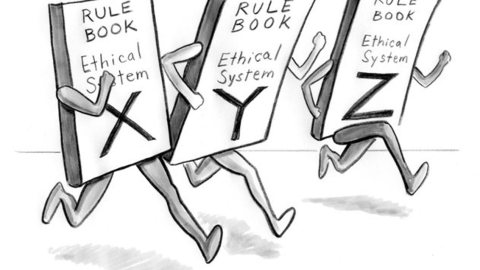The Moral Sciences Are Back

Natural laws of ethics, envisioned early in the Enlightenment, can now be objectively studied. Game Theory is reviving old wisdoms, while suggesting a “Golden Punishment Rule,” and a Naturalistic Fallacy reform (via “negative telos”).
1. Humans, being social, can’t thrive without rules. Certain rules work better than others. Game theory provides “behavioral telescopes” to study this.
2. The naturalistic fallacy says nature provides no ethical lessons. But without seeking good and evil in nature, we can compare the viability and productivity of behavioral rules. And we can map negative ethical spaces that are counterproductive or self-undermining.
3. Comparing how ethical traditions perform in Prisoner’s Dilemmas, against Tit-For-Tat, the best current strategy, shows: Rationalists do worse than the Golden Ruled. And Jewish norms beat Christian ethics.
4. So-called rationalists, dominated by dire untrusting logic, produce no cooperation. Golden Ruled players cooperate, thus beating rationalists. But Christian turning-the-other-cheek is exploitable (as Machiavelli and Nietzsche complained). Old Testament eye-for-an-eye is more Tit-For-Tat-like, provided forgiveness follows (however divine, forgiveness can be evolutionarily adaptive).
5. A Tit-For-Tat-like “Golden Punishment Rule” enables cooperation by preventing viable exploitation (likely applying to any game structure). But punishment that prevents profitable cheating must also avoid escalating revenge (e.g., hunter gatherers avoid kin feuds by delegating executions to relatives).
6. Darwin, being un-Darwinian, believed “social instincts … naturally lead to the golden rule.” Game theory shows how such “evolutionarily stable” cooperative rules can emerge. Indeed, evolution is nature’s game theorist, endlessly testing behavioral strategies and naturally selecting the more productive.
7. Social species’ behavioral patterns can be self-maximizing or co-maximizing. In Prisoner’s Dilemmas, that’s the lower-productivity “rationalist” approach vs. the higher-productivity Tit-For-Tat (Golden Punishment Ruled) cooperation. Let’s not forget we’re the most self-deficient, most other-dependent, species alive.
8. Co-maximization defines a win-win evolutionary space that can outperform “pure” short-term self-maximizing (see Dawkins’ selfishness vs. altruism error).
9. Life might not have a “telos,” (a grand purpose), but it has a kind of “negative telos.” Nature eliminates behavioral patterns that damage what they depend on. That’s a yet unnamed natural principle (I’ve suggested calling it needism), which even “survival of the fittest” must yield to.
We’d better adjust what’s deemed rational, to prevent self-maximization from becoming self-undermining (in economics, and politics).
Illustration by Julia Suits, The New Yorker Cartoonist & author of The Extraordinary Catalog of Peculiar Inventions.





